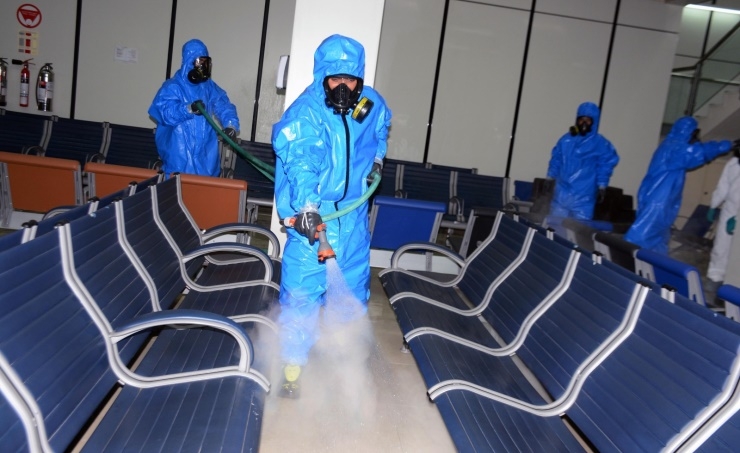Major evacuation plan for Bahraini citizens in Iran ‘being implemented’
Manama
The Ministry of Foreign Affairs has announced that it has begun implementing an evacuation plan for Bahraini nationals in Iran including screening and quarantine procedures, in response to the outbreak of Coronavirus (COVID-19) across Iranian cities.
The ministry called on all Bahraini citizens currently in Iran to register their details by calling 973 17227555. The ministry in co-operation with relevant entities in the Kingdom, will take all precautionary measures in order to guarantee the safety of Bahraini citizens currently present in Iran before their arrival in the Kingdom. These will include all necessary preventative measures following their arrival at the Bahrain International Airport, including screening and quarantine procedures in order to ensure the safety of citizens and residents and public health in the Kingdom.
Middle East countries jointly introduced tougher measures to contain the coronavirus outbreak on Friday with more than 360 cases confirmed across the region. Saudi Arabia suspended entry for visitors holding tourism visas from nations worst affected by the virus, including China, Italy, South Korea, Japan, Malaysia, Singapore and Kazakhstan. The Kingdom closed off the holy sites, barring pilgrims from Makkah and disrupting travel for thousands of Muslims visiting the kingdom on Thursday. The move is a first for Saudi Arabia - home to Islam’s holiest sites, which remained open during the 1918 flue epidemic that killed tens of millions worldwide. Egypt’s Al Azhar University ruled the step was compliant with Sharia.
“These measures are permissible, legitimate and rewarded. Rather, they are a legal duty to protect people,” Al Azhar said in a statement carried by the Saudi Press Agency. “We expect that this will give Saudi Arabia a chance to really strengthen their own disease control measures for the moment,” said Rick Brennan, the WHO’s emergency director for the Eastern Mediterranean. There have been no confirmed cases of coronavirus in Saudi Arabia but the measures are an indication of the concern accompanying the spread of the virus across the region. “We ask God Almighty to spare all humanity from all harm,” the Saudi Foreign Ministry said as it announced the decision to close access to the holy sites. No firm date has been given for the lifting of the restrictions, leading to concern that plans for the annual Hajj pilgrimage to Makkah at the end of July could be interrupted if the virus continues to spread.
A Ministry of Tourism spokesperson said the moves were “temporary and are subject to continuous evaluation by the competent authorities”. Authorities at Cairo’s international airport said the decision created “intense confusion” and “extreme anger” among thousands of passengers waiting for flights to Saudi Arabia. Reinforcements were called to control the crowd as the news broke, according to security officials who spoke on condition of anonymity. But as the outbreaks grow, countries across the region and worldwide are stepping up travel restrictions and imposing quarantines to limit further infections. Iran, which has been the hardest-hit country in the region, has now reported 388 cases and 34 deaths from the virus.
On Friday, Iran cancelled Friday prayers in major cities after reported infections more than doubled in a matter of days. A number of senior Iranian officials have tested positive for the disease, including Dr Mohamad Reza Ghadir, head of coronavirus management in the city of Qom, and, most recently, Masoumeh Ebtekar, who is President Hassan Rouhani’s deputy for women’s affairs and the highest-ranking woman in the government. A team from the World Health Organisation will travel to Iran over the weekend to assess the situation and distribute diagnostic kits and protective equipment for medical staff. Kuwait has also seen a rise in infections, with the total number of confirmed cases now at 45, all of them involving people who had been to Iran, a Kuwaiti health minister said on Thursday. The country’s state news agency, Kuna, said that studies at military colleges will be suspended for a fortnight from March 1 due to concerns over the outbreak.
Worldwide, the disease has infected more than 83,000 people in almost 60 countries. The total death toll now stands at more than 2,800 and officials have warned of its “pandemic potential.” Speaking on Thursday, UN health agency chief Tedros Adhanom Ghebreyesus said: “No country should assume it won’t get cases; that could be a fatal mistake, quite literally. This virus does not respect borders.” More countries have reported first cases of the disease in the past 24 hours, including Nigeria, Azerbaijan, Belarus, Lithuania, the Netherlands and New Zealand. However, new cases reported in mainland China, where the disease originated, have started to slow with 327 additional cases reported on Friday, bringing the country’s total to 78,824.
Related Posts

